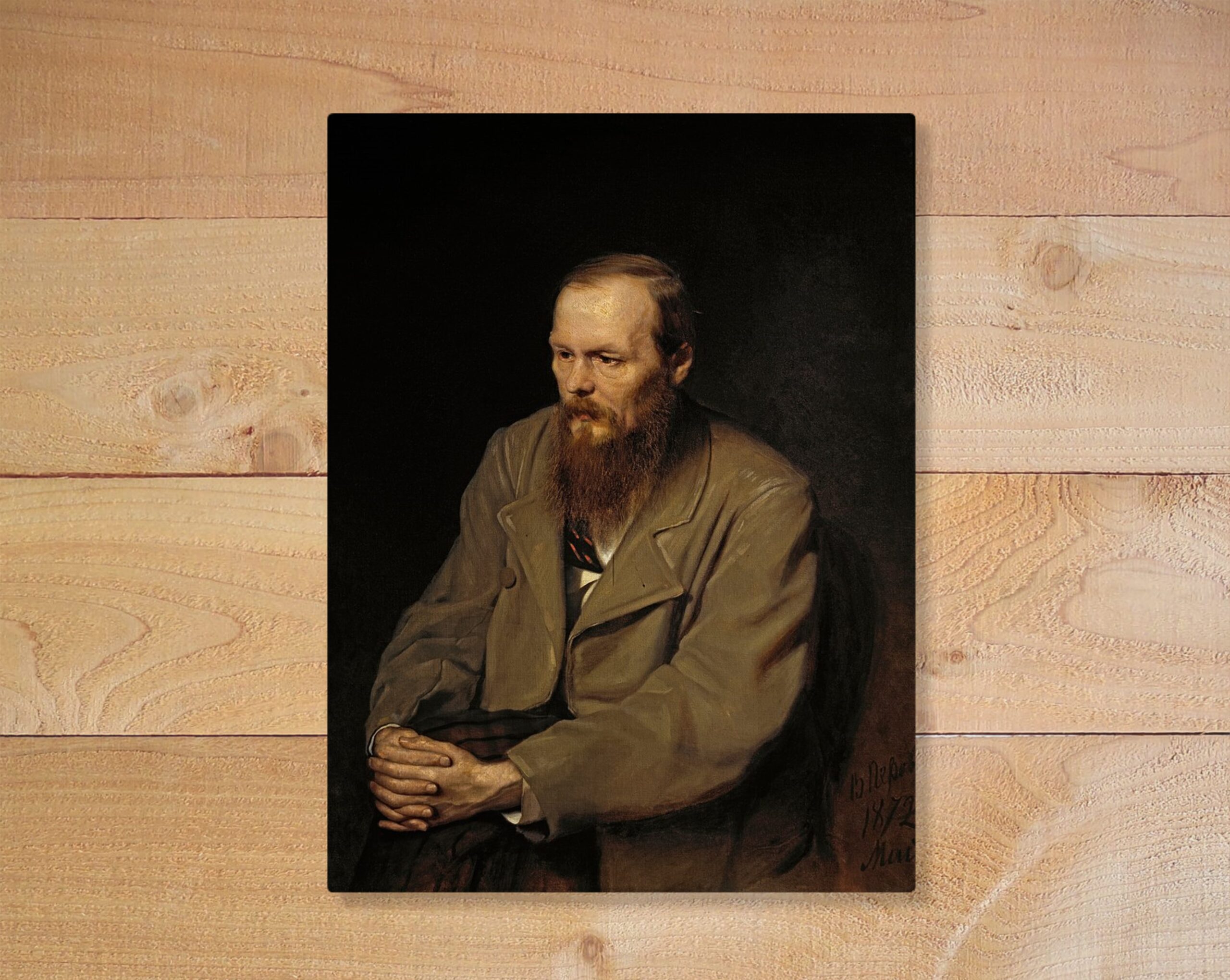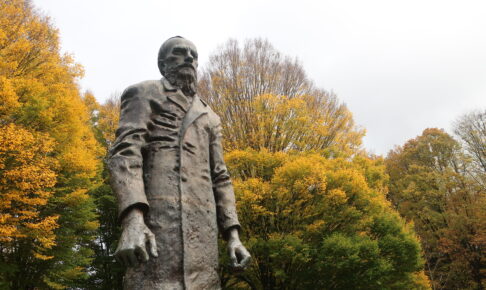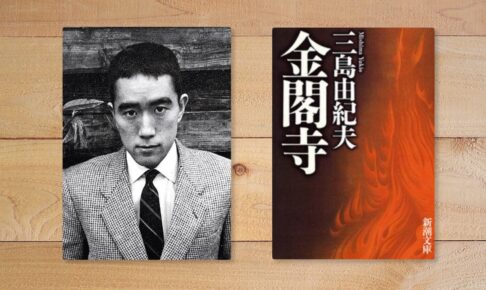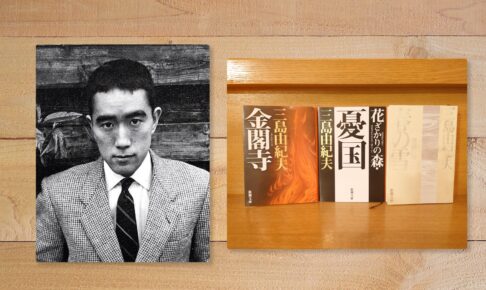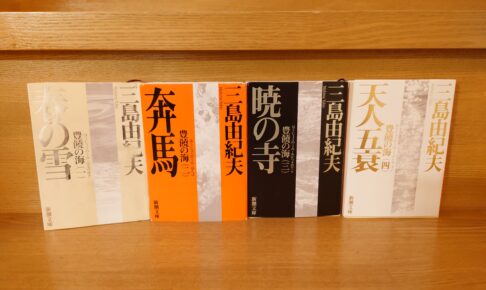Table of Contents
- 1 Four recommended works of Dostoevsky! A selection of gems and masterpieces of interesting Russian literature!
- 1.1 Dostoevsky's "Record of the House of Death" - A masterpiece about the extreme life in Siberian exile!
- 1.2 Crime and Punishment" - This work is the best way to experience Dostoevsky's black magic.
- 1.3 The White Dwarf" - That Tolstoy also praised it! Deep connection with Don Quixote and L'émisé.
- 1.4 The Brothers Karamazov - Dostoevsky's greatest work! What is God? What is life? What is Freedom?
- 2 Is Dostoevsky not recommended? I confess my personal feelings honestly.
- 3 Which translations and publishers do you recommend?
- 4 Where should I start reading Dostoevsky's works?
- 5 More interesting than a Dostoevsky novel! Dostoevsky in Recollection, a biography by Dostoevsky's wife
- 6 Conclusion
Four recommended works of Dostoevsky! A selection of gems and masterpieces of interesting Russian literature!
In this article, we will introduce the recommended works of Russian literary great Dostoevsky.
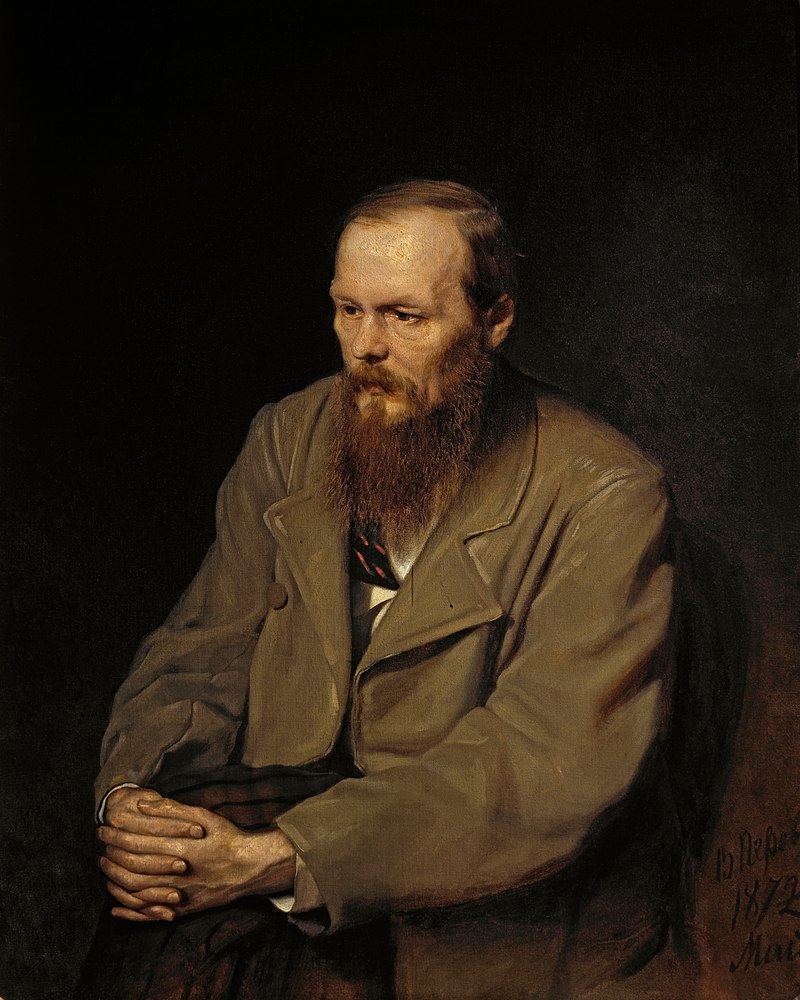
Dostoevsky is a Russian literary master along with Tolstoy.
Dostoevsky is an overwhelming giant who left behind such literary masterpieces as "Crime and Punishment" and "The Brothers Karamazov. His works plumb the depths of human psychology, opening up to us a profound and chaotic world. His stories, woven with his unique narrative style and strong personalities, have an indescribable black magic charm. I was one of those who were fascinated by his black magic.
I have been blogging about "Shinran and Dostoevsky" for almost four years starting in 2019. As for why I have been so fascinated with Dostoevsky.Why am I, a Buddhist monk, reading Dostoevsky and world literature?" Articles ~ "The Surprising Similarities Between Shinran and Dostoevsky"I would like to refer you to this article, as I talked about it in the summary article of theThe Brothers Karamazov.It was a great encounter with
I was struck by Dostoevsky's lightning bolt. Since then, Dostoevsky has occupied an enormous place in my life. Dostoevsky is at the very root of what I am as a monk. That is why I continued to study Dostoevsky.
Now, without further ado, I would like to introduce my recommendation of Dostoevsky's works, as I have been fascinated by him.
Dostoevsky, Records of the House of Death.~ A masterpiece depicting the extreme life in Siberian exile!
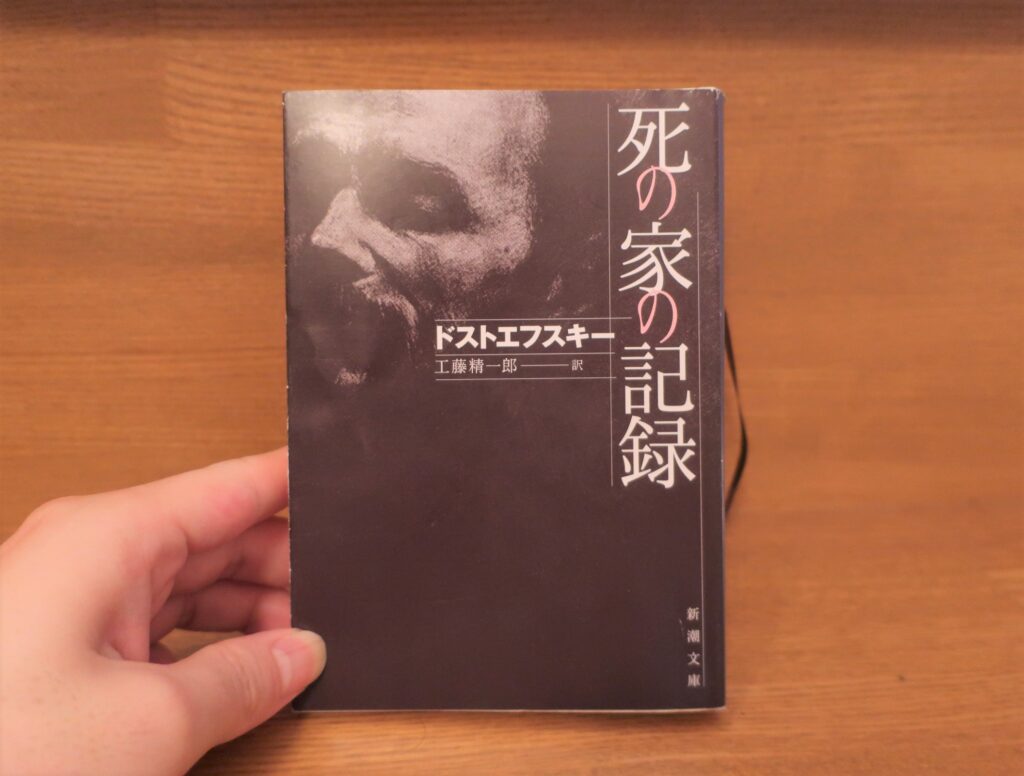
In January 1850, Dostoevsky arrived at the Omsk fortress prison with a single Bible in his pocket.
AmazonProducts Page.
And then to four years in prison - and then to four years in prison.
The author, who was arrested as a thought criminal and sentenced to death but was pardoned and exiled to Siberia just before his execution, records his experiences and observations during his four years in prison. The author artistically recreates the hellish prison life, the gruesome flogging, and the mind of a criminal in a beastly state through deep and acute observation and accurate description, demonstrating the maturity of an artist whose theme is suffering, and making Dostoevsky's name world famous.
The Record of the House of Death is my top recommendation of Dostoevsky's work. I think this book is the best entry point for ease of reading, quantity, and a sense of Dostoevsky's character.
Dostoevsky was arrested in 1849 as a thought criminal for frequenting socialist thought circles and was exiled to the Omsk prison in frigid Siberia.
On December 24, he was taken away in a horse-drawn carriage in extremely cold weather, with temperatures reaching 40 degrees below zero. He arrived at Omsk Prison on January 23, about a month later.
As the book introduction above states, this work details the experiences in the Omsk prison in Siberia.
Dostoevsky is known for his psychological depictions that seem to gouge out the depths of the mind, but in this work, rather than describing the inner life, he calmly analyzes the situation around him and the psychology of the other prisoners through the eyes of the protagonist.
The quality of the work was so good that even the great writers Tolstoy and Turgenev praised it.
In this sense, the novel can be said to be a very readable work, more so than other Dostoevsky works.
This is the memoir of Dostoevsky, a monster of psychological exploration, who lived with and observed up-close and personal the extraordinary prisoners in the extreme conditions of a Siberian prison. In other words, how could it not be interesting?
As Tolstoy and Turgenev praised, the scenes depicted in this work are as realistic and lifelike as if you were watching a movie. The scenes are depicted with such power that the reader feels as if he or she is there.
The story unfolds quickly, with scenes moving from one to another, so that you can't stop turning the pages.
Moreover, Dostoevsky is able to perform astonishing human analysis throughout.
Dostoevsky's eye for human nature seems to have been sharpened even more in the extreme conditions of prison.
In that respect, this book is Frankl'sNight and Fog.It may be said that this work is similar to
I believe that this is a work that sinks so deep into the human condition. It occupies a unique position among Dostoevsky's works. It was in this Siberian exile that he had the experience that would become the starting point for his later five major works, and it is in "Record of a House of Death. It is a very important work in terms of understanding the characteristics of Dostoevsky.
Crime and Punishment."~ If you want to experience Dostoevsky's black magic, this is the work for you.

Raskolnikov, a poor university student with a sharp mind, decides to put his wealth to good use by murdering a greedy old loan shark on the theory that one small crime can be atoned for by a hundred good deeds, but he also kills her sister who happens to be there. This unexpected second murder weighs heavily on Raskolnikov's mind, and he must find himself in a miserable state of guilt.
AmazonProducts Page.
Crime and Punishment" is Dostoevsky's well-known masterpiece. This work is also easily recommended as an introduction to Dostoevsky.
This work is a novel that is full of mystery novel elements, social genre pictures, love elements, ideological elements, psychological elements, and so on.
Moreover, there are not only various elements, but each of them is also deep and profound...!
As the translator, Mr. Kudo, says, "As you read the book, you are infected with an unusual enthusiasm, and when you finish reading it, you cannot help but think about it.
The story of the protagonist Raskolnikov's suffering and the various characters are depicted with unusual intensity.
When Dostoevsky finished this novel, his life was at rock bottom.
I can't tell you more about it here, but he wrote from morning to night locked in his room in extreme conditions, mentally and physically, "while being burned by something like a fever," he said.
It is now the realm of madness.
This work, written in one fell swoop by such a monster Dostoevsky, has a black-magical magic.
I don't know how to explain this magic, but anyway,Read on to find out.Seeing is believing. Think you've been fooled and read it first. It is worth it. I am sure you will understand the meaning of black magic. I think this will be a rare reading experience.
However, a novice reader may be taken aback if he or she reads this work out of the blue. The names of the characters are complicated, and many may be puzzled by Dostoevsky's unique narrative style. All of the works introduced here have such elements.
However, it is by no means a difficult book that you cannot compete with at all. It can be read in the same way as a contemporary novel. If you are not afraid of reading books to some extent, you should be able to read it without any problem. We hope you will experience Dostoevsky's black magic.
The Moron.~Tolstoy also praised it! Deep connection with Don Quixote and Remise.
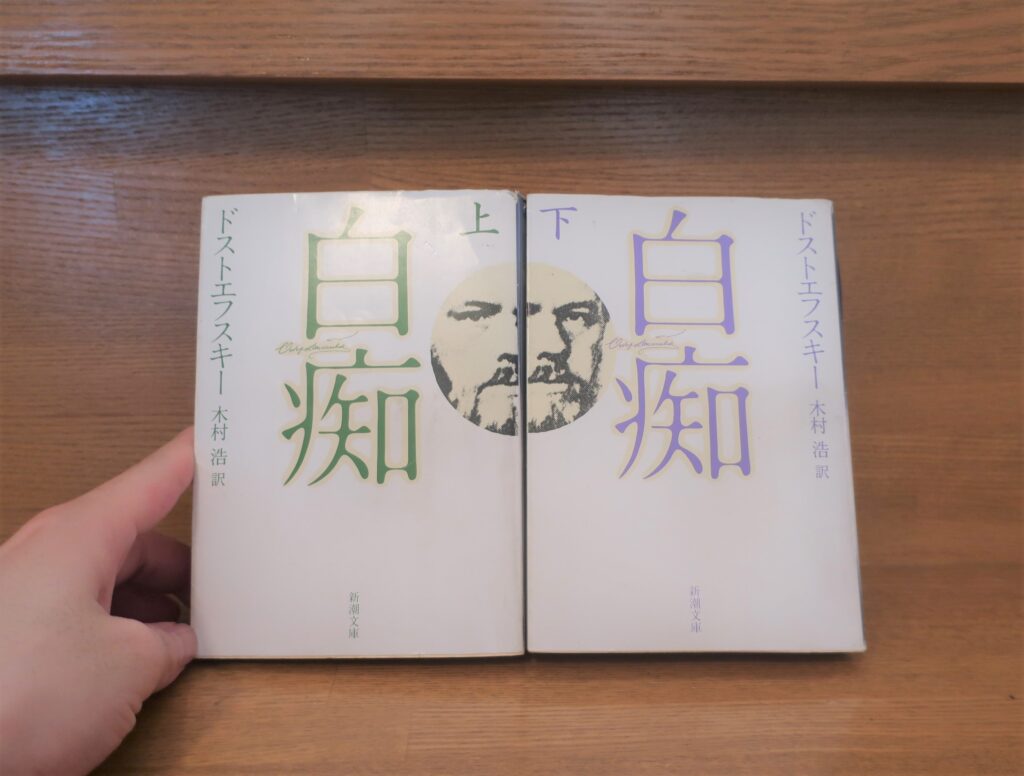
What is the "unconditionally beautiful human being" that Dostoevsky, the world's greatest writer, wanted to portray?
AmazonProducts Page.
Coming of age in a Swiss sanatorium, Duke Myshkin returns home with no knowledge of the realities of Russia. The Duke's innocence and purity of heart make him beloved by all and stirs their souls, but the people of Russian customs are more confused and disturbed by him. The turmoil deepens when Nastassja, a beautiful woman who has never lost her pride even in the face of disgrace, is discovered.
I love "Moron" as well. Personally.Crime and Punishment."I think I might like it better than
What is interesting is that the descriptions of each character's facial expressions and gestures are surprisingly subtle, giving the reader a strange feeling as if something is penetrating into his or her psyche.
There is also a sense of tension in this work, as one never knows what will pop up next. It is a harrowing development in which all the characters have mysteries and situations move suddenly and unexpectedly.
Above all, the charm of the main character, Myshkin, stands out in this work.
Myshkin is a good person anyway. And he has the uncanny ability to see through the depths of others' hearts and make them open up before you know it.
He has such a mysterious charm and is such a beautiful human being that he is called the Marquis de Christ by the characters he works with.
However, he is also an epileptic who is sometimes mocked as a "moron. He is also astonishingly ignorant of the rules and subtleties of Russian society, having spent a long time recovering in the mountains of Switzerland.
In other words, in Russia he is a completely alien person, so much so that he seems to be an inhabitant of the lunar world.
Myshkin himself is troubled by this, but can't help himself.
The good protagonist who does not fit in with the real world. That is Myshkin in "Moron".
The wheels of the story are set in motion by the appearance of Christ Marquis Muyshkin in Russian society.
The drama that unfolds around him is a drama of human love, hatred, mental confusion, and the search for the meaning of life.
Here, the story is complicated and intertwined with everything else.
The chaos and uncertainty of the human mind, the rage to the point where you don't know what you will do next.
And the final act of "Hakuchi" ends with an artistic scene that will remain in the annals of literary history.
The great writer Tolstoy also praised this work and about the main character Myshkin,
It is a diamond. For those who know its value, it is comparable to thousands of diamonds.
Although it aims to portray Christ as "an unconditionally beautiful human being," it is more than enough to enjoy without any knowledge of Christianity. (Of course, it is better to know about it to appreciate it more deeply.)
It is such an outstanding work of fiction and art.
Also striking is the intense painting "Dead Christ in the Tomb" that appears in the novel. Dostoevsky was shocked when he actually saw the painting in Basel, Switzerland. The horrific realism of this painting is a key element in his work. I also went to see the painting in 2022. I would like to share my experience with you in the following article.
Although "The Idiot" has been overshadowed by "Crime and Punishment" and has not been shown much, it is a highly acclaimed masterpiece by Dostoevsky. It is interesting. I strongly recommend it.
The Brothers Karamazov.~ Dostoevsky's greatest work! What is God? What is life? What is Freedom?
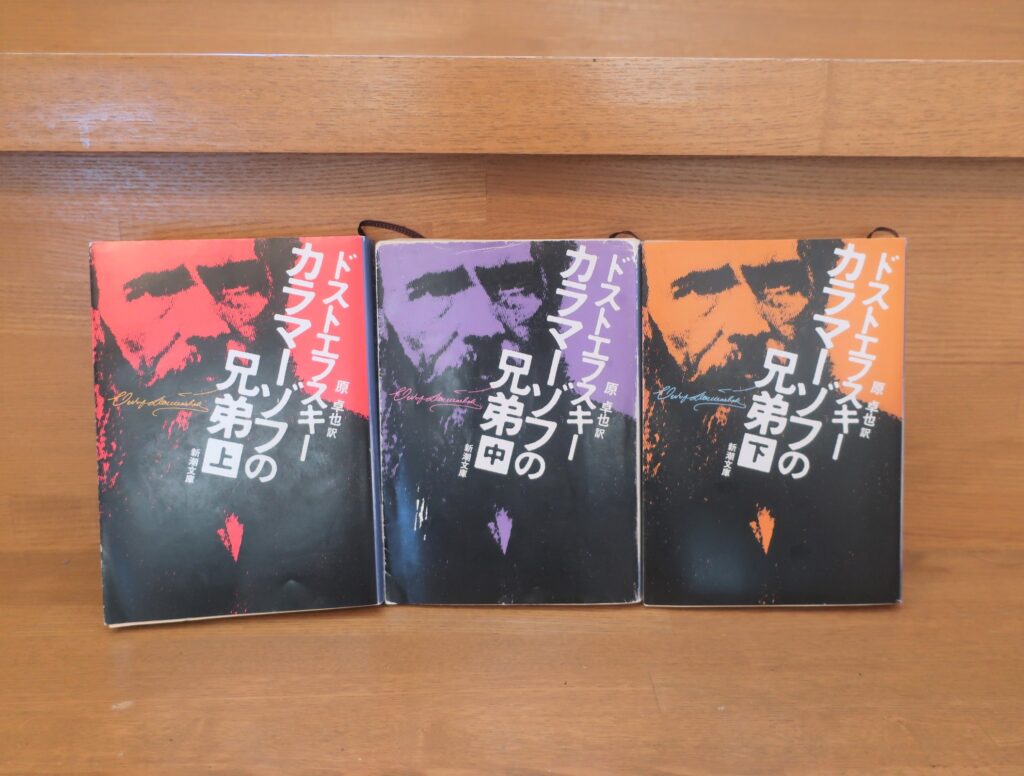
The author had declared at the beginning of the book, "In the author's own words," that he would "continue and draw a contemporary version,
AmazonProducts Page.
In other words, it is the last unfinished work.
Needless to say, the book has sold a total of 1.7 million copies to rave reviews from all walks of life throughout the ages.
Recently, "No. 1 book recommended by a teacher at the University of Tokyo to new students!" as well.
Three brothers, each with a different but strong bloodline from their greedy father, Fyodor Karamazov, are the heroes of the story. Dmitrii, a prodigal and passionate man, Ivan, a cool-headed intellectual, and Alyosha, a devout monk and the hero of the story. And Smerzhakov, rumored to be Fyodor's bastard son. In the hellscape of love and hate created by the interplay of these characters, the fundamental problem of God and man is set in place in one of the greatest masterpieces of world literature.
The Brothers Karamazov was Dostoevsky's last work, written in the last years of his life.
As the synopsis above indicates, Dostoevsky depicted the fundamental issue of "God and man," which he held unchanged throughout his life, and this work is the culmination of his worldview.
The biggest climax of this work appears at the end of the upper volumeChapter of the Grand Inquisitor."It is. Once you read it, it has such an impact that you will never forget it.
The Brothers Karamazov is one of my favorite Dostoevsky works and one to which I have a strong emotional attachment.
However, this work is not recommended for everyone. It is a large work of more than 1,900 pages, including the upper and lower volumes, and there are some difficult passages. Moreover, as is often said, the first part of the first volume is difficult to read.
The first half of the upper volume will require patience. To be honest, the first half of the book is more of a prologue, or a prelude to the excitement that will come in the middle of the book.
Perhaps this is where most people fall short.
However, if you persevere here, the engine will start to rev up quickly from the second half of the upper volume.
If you have been patiently reading this book up to this point, you will be swept away by the momentum of Dostoevsky's writing, as if the energy that has been building up until this point explodes.
The momentum does not stop when you enter the middle and lower volumes. I can assure you that you will be so immersed in the book that you will not be able to get out of it. It is that amazing. This work is that great.
Once you get through the first half of the upper volume, the rest of the book is a rage.
In the following article, we will discuss this work in more depth, and we hope you will enjoy it. This work is often said to be "difficult" or "hard to read," and we will also take a closer look at the reasons why people feel this way.
Knowing the background of this work makes "The Brothers Karamazov" look different.
The Brothers Karamazov is one of my favorite Dostoevsky works and one to which I have a strong emotional attachment.
Although it is difficult to pick up this work because it is a full-length novel, I heartily recommend it.
Is Dostoevsky not recommended? I confess my personal feelings honestly.
Now, I have introduced four recommended works by Dostoevsky. After four years of study on the subject of "Shinran and Dostoevsky," I can confidently recommend these four works to you.
However, some of you who have been following our blog may have wondered why we wrote an article on Dostoevsky's "recommended works" only now, when we already had articles on Tolstoy, Chekhov, Shakespeare and other recommended works.
Why did I, a lover of Dostoevsky, not write an "article on recommended works" until now?In fact, as much as I love Dostoevsky, I can't casually recommend him to others!The company was suffering from a contradiction of the two.
Let's be honest and come clean.I cannot recommend Dostoevsky enough.
Dostoevsky's recommended works! What a rhetorical question after having said all this! You may be thinking, "What a rhetorical question!
Precisely,I cannot casually recommend Dostoevsky to everyone."I would like to say.
What this means, to state it simply, is thatDostoevsky is difficult.This is what we are trying to do.
If you are a novice reader or are not used to heavy, long novels, suddenly picking up a Dostoevsky work can make you dizzy from the sheer volume, difficult language, and narrative. Worst of all, you may end up hating reading. I am afraid of that. Moreover, Dostoevsky's works are filled with his thoughts. Depending on how you perceive them, the way you see his works will vary considerably. It is very possible that some people may read completely different themes in the same work.
The fact that different readers receive different things may, in a sense, be considered the depth of the work. It can be a strong point. This depth and room for the reader's thought is definitely one of the charms of Dostoevsky's works, but to be honest, I do not recommend it for beginners. There is a high possibility that you will fail without understanding the meaning of the work.
However, if you are still interested in reading Dostoevsky, we highly recommend reading his works. Of course, if you are familiar with reading, you can read Dostoevsky without any problems. We hope you will enjoy Dostoevsky's unique worldview.
In the following article, I discuss my own personal experience in reading Dostoevsky's works. I hope you will find it useful.
Which translations and publishers do you recommend?
Dostoevsky's works are published by numerous publishers, including Iwanami Shoten, Shinchosha, and Kobunsha.
Of these, I would recommend the Shinchosha edition of Dostoevsky's works.
I personally think that the Shinchosha edition is a must, especially for the five major long stories.
The translation is excellent, faithful to Dostoevsky's original, yet easy to read for us moderns.
Among them, I highly recommend that you pick up the Shinchosha edition of "The Brothers Karamazov" translated by Takuya Hara.
In addition, a recent new translation by Suiseisha and Naoto SugisatoThe Brothers Karamazov.I also recommend I have found the explanations to be very comprehensive.Why is "The Brothers Karamazov" so difficult? What was the theme and against what background was it written - what did Dostoevsky want to convey in this novel?"I referred to this in my article on the
If you want to pick up Dostoevsky's works casually, the Shinchosha edition is the best choice. I basically read his works in the Shinchosha edition.
Where should I start reading Dostoevsky's works?
I would like to read Dostoevsky, but what exactly should I start with? Is there a recommended order?
This is a problem that many of you may be struggling with.
Indeed, this is a difficult problem.
Many of you may have tried reading "Crime and Punishment" or "The Brothers Karamazov" because they are "famous works," but failed at an early stage.
Recently I have also been asked by a student if "Crime and Punishment" is easy to read? Where should I start? Can I read Dostoevsky? This is a very difficult question.
As I mentioned earlier, it is quite challenging for a novice reader to suddenly read "Crime and Punishment" or "The Brothers Karamazov". If you are a seasoned reader, I would answer that you can start with anything, but if you are not, I would start with Dostoevsky.The Record of the House of Death."is recommended.
As mentioned in the "4 recommended works" section above.The Record of the House of Death."is just easy to read. Moreover, the story is divided into chapters, so the tempo is good. The names of the characters and the plot of the story are also much clearer and easier to understand than those of the five major feature stories.
It was also the basis for his later five major novels. This work is therefore an excellent introduction to Dostoevsky.
And if possible, I recommend reading some commentaries before going into the longer works such as "Crime and Punishment," "The Idiot," "Evil Spirits," "The Brothers Karamazov," etc. You will enjoy reading them far more than if you simply read them.
I recommend the book by Yasuyuki TakahashiGreek Orthodoxy."and Huderi's bookThe Dostoevskii Legacy.Written by Seiro SatoThe Viewer and the Seeker: Turgenev and Dostoevsky.It is.
In "Greek Orthodoxy" by Yasuyuki Takahashi, we can learn about the relationship between Dostoevsky and Christianity. We tend to think of Christianity as Roman Catholicism or Protestantism, but Dostoevsky was a believer in Russian Orthodoxy. Without knowledge of Russian Orthodoxy, it is difficult to understand the religious stories preached in Dostoevsky's works. This is especially true in "The Brothers Karamazov. The most important chapter, "The Grand Inquisitor," is the very heart of Dostoevsky's theory of religion. Since "Crime and Punishment" also has a large religious component, I strongly recommend reading "Greek Orthodoxy" as an introduction to this work.
The next book, "The Legacy of Dostoevsky" by Fudeli, discusses Dostoevsky's works along with his life. It is very thorough and easy to understand in terms of deepening one's understanding of his works. The work reads like a biography and is very useful in learning about his life.
This is the best book to learn about Dostoevsky's image as a Russian Orthodox religious figure.
And then there is "The Watcher and the Seeker: Turgenev and Dostoevsky" by Seiro Sato. This is another great book among great books. It is my favorite reference book.
The book is an attempt to take a fresh look at the literary styles of the two men, focusing on the temperaments and personalities of Turgenev, the "watcher," and Dostoevsky, the "seeker," as the title suggests.
The book is unique above all in that it reveals the differences between Turgenev and Dostoevsky through their lives and works.
Turgenev, the calm, middle-of-the-road observer, and Dostoevsky, the impassioned seeker who has to be thorough in everything he does.
The author will discuss why the two took such different paths and where the differences in their styles came from. It is best to read this reference book after reading the works of both Dostoevsky and Turgenev, but even if you have never read them at all, it is very interesting to learn about their differences. This commentary is also a wonderful compass for those who want to read Dostoevsky in the future.
I feel that reading these commentaries and getting to know the general framework of Dostoevsky before plunging into the five major works will make for a more enjoyable reading experience.
Read "Death House Records" first, then read some of the commentaries from there, and then go into your favorite full-length book. This is the process I recommend.
We hope you will find the following article a useful reference for Dostoevsky's recommendations.
More interesting than a Dostoevsky novel! Dostoevsky in Recollection, a biography by Dostoevsky's wife

We have introduced recommended works and reference books on Dostoevsky, but we would like to recommend here a biography by Dostoevsky's wifeDostoevsky in Recollection."It is.
It was "The Brothers Karamazov" that inspired me to study Dostoevsky.
But it was this "Dostoevsky in Recollection" that made me fall in love with Dostoevsky from the bottom of my heart.
And then there is Dostoevsky and his wife Anna's trip to Western Europe, which is preached in the book. This struck a chord with me. After their honeymoon, they left Russia and traveled to Europe. Their destiny would change dramatically during their four-year stay in Western Europe. Without this trip, the great works that followed "Moron" would never have been produced, namely "Evil Spirits," "The Minor," and "The Brothers Karamazov. That is how significant this trip was for Dostoevsky.
Above all, through this journey, the two were strongly connected, and Dostoevsky was able to enjoy a happy family life that was completely different from the life he had spent suffering through the first half of his life. Dostoevsky may have a heavy and gloomy image, but in his later years, he was happy. This was a fact that greatly helped me.
And now that I have been studying Dostoevsky for more than four years already, I feel strongly. I like Dostoevsky with his wife Anna."
Dostoevsky's novels are interesting. And above all, they are profound. It has had a tremendous impact on my life as a monk.
But this biography of Madame Anna had no less a huge impact on me. It is thanks to this book that I fell in love with Dostoevsky from the bottom of my heart. I loved this biography so much that last year, in 2022, I went on a tour of the places mentioned in this biography. The record of that trip isDostoevsky and His Wife's Fateful Journey: Travels in Western Europe in Madness and Love.The article will be called.
I strongly hope that this biography of Madame Anna will be widely disseminated. To be honest, I love this work so much that I would rather tell you to read this biography than Dostoevsky's work itself. It is such a wonderful work. Unfortunately, however, this biography has not yet been published in paperback. I only hope that "Dostoevsky in Retrospect" by Anna's wife will be published in the library.
*August 19, 2023 added.
Ranman] Week 20 "Kirengeshouma" Next week's preview [Changes in the environment of the tenement where Mantaro (Ryunosuke Kamiki) lives...? | NHK https://t.co/zkKugRrxEN @YouTube.
- Takahiro Ueda @Hakodate Kinshokuji Temple (@kinsyokuzi) August 14, 2023
This week's NHK morning dramaRamblings.When I saw Jueko, who successfully chased away debt collectors at the "Kayo" (a restaurant), I couldn't help but think of Dostoevsky's wife, Lady Anna.
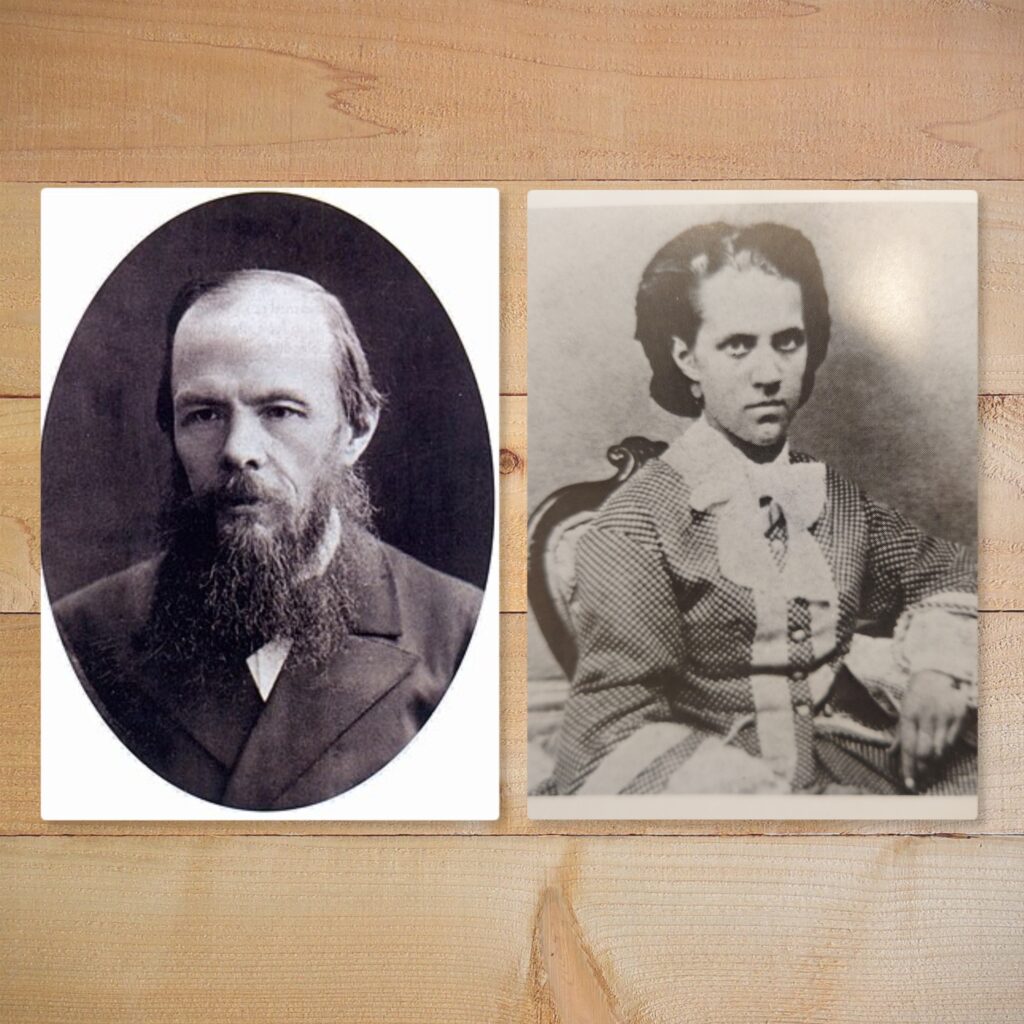
Mrs. Anna also supported Dostoevsky, who had no livelihood, and even helped him clean up his manuscripts, publish them, and even fight off debt collectors.
To be honest, there have been many times in the past when I have watched "Ranman" that I have felt Mrs. Anna in Jueko, but this broadcast has confirmed it.
Dostoevsky and his wife Anna first met in October 1866. Dostoevsky was 45 years old and Anna was 20 years old. At that time, she was still a student attending a stenography course.
This is also similar to Mr. and Mrs. Makino. A husband with overwhelming talent and a young wife. And both Jueko and his wife Anna share a love of literature.
And above all, the poverty-stricken life after marriage is exactly the same, from which the wife takes the plunge and runs a practical business.
In this regard, the followingTravels in Germany" (27) Mrs. Anna's Warriors after returning to Japan! She even fights off debt collectors! Even Dostoevsky has full confidence in her!I hope you will take a look at the article "The resemblance between Jueko and me" where I talk in detail about the two of us. I think you will be surprised at how much you and Jueko look alike.
Conclusion
Now that we have discussed my recommendations for Dostoevsky's works, their reference books, and the order in which they should be read.
Some of you may be wondering whyEvil Spirits."andThe Memoirs of a Basement.You may have wondered why well-known novels such as
But this is quite simple. These two works are.In me."This means that they were not very successful works. There is no doubt that these two works are masterpieces of Dostoevsky. However, I personally have a hard time with them. This is especially true of "Evil Spirits," which makes me sick every time I read it. I must have fallen into Dostoevsky's black magic, the art of possession.
However, this does not mean that "Evil Spirits" and "Memoirs of a Basement" are inferior in any way. I know people who love "Evil Spirits," and I know that there are many people in the world who appreciate "Memoirs of a Basement.
The problem is that even if they are the same Dostoevsky works, some works may have different tastes. This is true for Haruki Murakami's works as well. I have a preference forDance Dance Dance.and "Hard-Boiled Wonderland," but it is often the case that others may not think so at all.
So the four works recommended in this article areMy personal recommendationswill be.
At the same time, there are some works that I personally like, although I cannot easily recommend them. The first of these is Dostoevsky's early middle novelDual personalities (alter egos)."It is.
I myself was very moved by this work. Personally, I love "Dual Personalities" so much that it ranks high among Dostoevsky's works.
I don't fit in well with others. I want to fit in, but I also don't want to fit in. What am I? Why am I the way I am? What should I do? Why am I so mean? Is there something wrong with me? How can I live? Why do I have to suffer so much?
If you have such a problem, this is the work you should read. Here is a drama of human beings with the same problems. Dostoevsky is on the side of such people.
I remember reading this work and feeling a strange sense of relief that there were others who endured the same suffering, even though I sympathized and suffered with them.
Of course, this piece does not have a happy ending.
It is a work that leaves a deep impression on the heart. It is a little difficult to read, so I do not recommend it casually, but I personally love this work.
Another letter I would like to introduce is Dostoevsky's letter.(28) Visiting the German spa resort of Bad Ems, a place associated with Dostoevsky - Dostoevsky still sends ardent love letters to his wife 10 years after their marriage."As I told you in my article on the "Dostoevsky's Letters", Dostoevsky's letters are also interesting.
Dostoevsky's letters from Bad Ems, a spa resort in Germany, describe the daily events there and his love for his wife Anna. Since these letters are written almost daily, they read like Dostoevsky's diary. And this is just fascinating. Dostoevsky has produced many profound works of fiction, but if he were to publish a carefree travelogue or diary, it would be so interesting that it would probably be his big breakthrough.
It is Dostoevsky who also has a journalistic sense. He would be able to write an interesting article based on casual daily events and experiences in a strange town. In these letters, Dostoevsky describes his days in Ems to his wife Anna in great detail. The way Dostoevsky describes his days in Ems is as if the local conditions were right in front of his eyes. It is as if the local conditions were right in front of our eyes! If all of these letters were compiled into a book, it would be very interesting. For more details, please refer to the above article, which introduces the actual contents of the letters, and we hope that this letter will be published together with "Dostoevsky's Recollections" by Mrs. Anna.
Now, I have spoken at length, but I would be happy if I could be of any help to you in reading Dostoevsky's works.
I may have confused you by saying that I do not recommend Dostoevsky, or by saying that I recommend "Recollections" by Madame Anna, but I am here to express my honest feelings as a lover of Dostoevsky. Thank you for your patience up to this point.
These are the four recommended works of Dostoevsky! A Pearl of Russian Literature, a Masterpiece of Interest!" The above is "4 recommended works of Dostoevsky!
Related Articles











